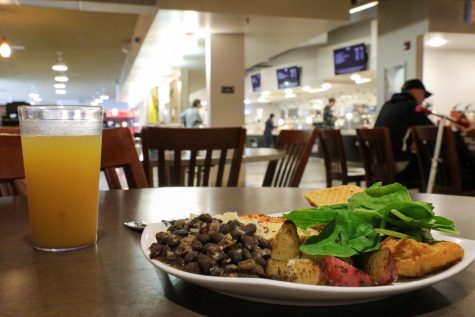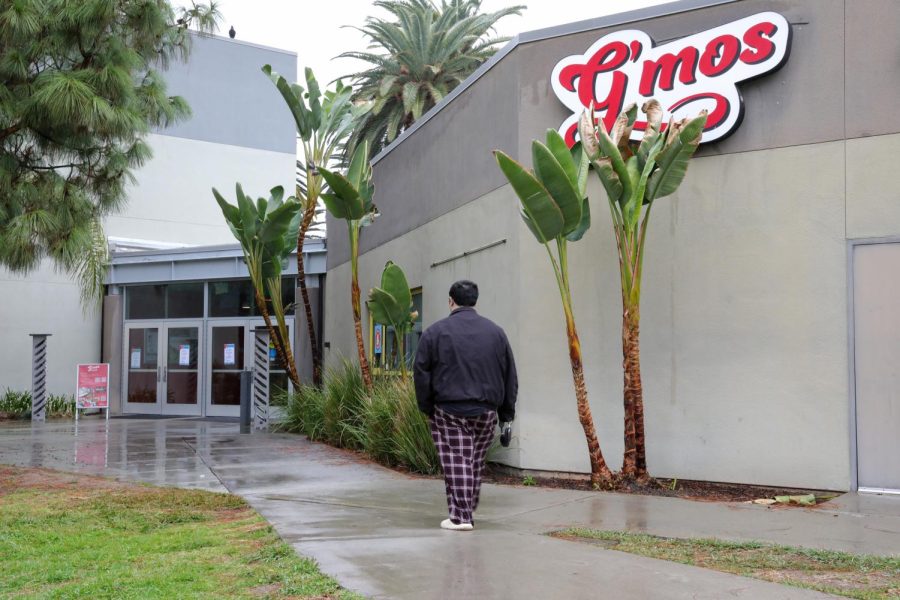G’mos rebranded and reconfigured under new management
November 8, 2022
Two years ago, CSUN made the decision to outsource campus food services to a new company. The move worked to keep campus dining open throughout the pandemic, but now that campus reopened some students are finding issues with the resident dining hall, G’mos.
The University Corporation outsourced all of the former CSUN dining services to Chartwells Higher Education back in the fall of 2020. Chartwells Higher Education is a food service company that operates on 300 college campuses in the U.S., according to its website. The company is a subsidiary of the U.K.-based Compass Group, the world’s largest food service company. Chartwells manages everything from food sourcing to marketing in the schools that it operates in.
Due to the abrupt shift to virtual education, TUC was having financial trouble running food services for the students who remained in the dorms. TUC said it had only sold 200 meal plans in the fall of 2020, compared to the 1500 it usually sells each semester. Together with a change to TUC’s retirement benefits, a wage and hiring freeze, and a layoff of 469 employees, the change to Chartwells helped keep TUC from a $2 million deficit.
Rick Evans, executive director of The University Corporation, said that TUC believed Chartwells was in a “far better” position to rebuild campus food services. Evans believes that Chartwells has handled industry issues like rising food costs and food supply disruptions better than TUC could have operating on its own.
“They also have a far greater capacity to procure the types of food products, through their various supply networks. Even with this infrastructure, Chartwells has still had challenges to overcome, but everyday things are improving,” said Evans.

In April of this year, the California State University system entered a 10-year agreement with Chartwells. The agreement allowed for any of the 23 CSU campuses to outsource its food service needs to Chartwells. Nine CSU campuses are currently partnered with Chartwells.
“We are pleased to have reached this agreement with Chartwells,” said Brad Wells, CSU’s associate vice chancellor of business and finance, in a Chartwells’ press release.
According to the press release, Chartwells claimed it could bring student benefits such as meal plan support and food events. One purported benefit of Chartwells’ rebrand of CSUN Dining to Matador Eats was the updated meal plan options for students after the overhaul.
Resident meal plans have started including more MataCash, credit that can be used to buy meals anywhere on campus. Matador Eats also introduced $500 meal plans targeting off-campus students. These cheaper meal plans include a limited amount of MataCash and meals at G’mos. Matador Eats also hosts periodic student events, like last week’s Halloween Pumpkin Painting event at G’mos that featured music and pumpkin-related games and activities.
Matador Eats has had some trouble meeting some students’ expectations at G’mos, as more students have trickled back on to campus. In an informal Reddit poll conducted by The Sundial, 80 out of 132 people polled answered that “G’mos’ food is not good.” Six people responded that “G’mos’ food is good,” while 46 people said “G’mos’ food is fine.”

In a post in the CSUN subreddit, a user complained about G’mos having cleanliness and food temperature issues, and shortages of condiments and drinks. The student was concerned that items such as eggs and chicken were “at best lukewarm” and would be unsafe, while commenting on “filthy” tables and a trip to G’mos where the soda machines were out of carbon dioxide and soda syrup. The user reported that he spoke with a head chef, who said that the staff was “very green” and that work orders had been placed for broken equipment.
Omar Galvez, Chartwells’ Southern California district manager, said that the company has received complaints about students wanting more variety in food options, as well as a shortage of utensils and condiments. Galvez said that G’mos is now nearly fully staffed.
Staffing issues have been a concern, along with supply chain issues faced by industries worldwide during the pandemic.
“While preparing for the semester, we anticipated the global supply chain disruption and ordered items in high quantities to offset the shortages,” said Galvez. “However, occasionally there have been longer fulfillment times than expected.”
